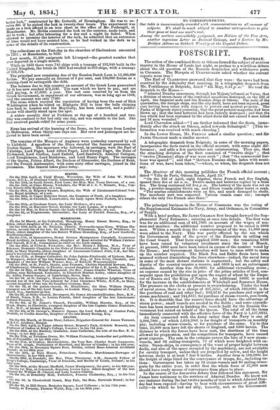POSTSCRIPT.
SATURDAY.
The action of the combined fleets at Odessa formed the subject of anxious inquiry in the House of Lords last night, as preface to a worthless debate about the old question of the Russian despatches and withdrawn posts in Circassia. The Marquis of CLANRICARDE asked whether the current reports were true ?
The Earl of CLARENDON answered that they were : the news had been received by the Admiralty that morning, in a telegraphic despatch from
Mr. Fonblanque at Belgrade, dated " 4th May, 6.45 p. He read the despatch to the House-
" Admiral Dundas announces, through her Majesty's Consul at Varna, that a division of steam-boats of the combined squadrons destroyed, on the 22d of April, the Imperial mole and the Russian ships at Odessa. The mole of the quarantine, the foreign ships, and the city itself, have not been injured, great care having been taken with respect to private and neutral property. The Pasha of Belgrade stated yesterday, that the great powder-magazine had been blown up ; that the land batteries had been entirely destroyed ; and that the loss which had been sustained by the allied fleets did not exceed 8 men killed and 18 men wounded."
Lord Clarendon added—" I am further informed that the fleets, imme- diately after the attack on Odessa, sailed towards Sebastopol." [This in- formation was received with much cheering.]
In the Lower House, Mr. FRENCH asked a similar question ; and Six JAMES GRAHAM made a similar answer.
A telegraphic despatch from Belgrade, in some of the morning papers, incorporates the facts stated in the official account, with some slight dif-
ferences; adds a few particulars not uninteresting. They are, that the attacking division of the fleet consisted of "twelve ships" ; that "twelve [Russian] ships of war were sunk" ; that "the commercial har- bour was spared " ; and that " thirteen Russian ships, laden with muni- tions of war, have been taken,"—where, or when, the despatch does not say.
The Moniteur of this morning publishes the French official account ; dated " Ville de Paris, Odessa Roads, April 25," " On the 22d. of April, eight frigates, three French and five English, opened their fire at six a. m. Twelve moles and batteries replied by a brisk fire. The firing continued till five p. m. The battery of the mole was set on fire, a powder-magazine blown up, and fifteen vessels either burnt or sunk. "The marine establishments were on fire, and much damaged by shells. The merchant port was respected. Various vessels came out; amongst others the only two French ones there."


























 Previous page
Previous page